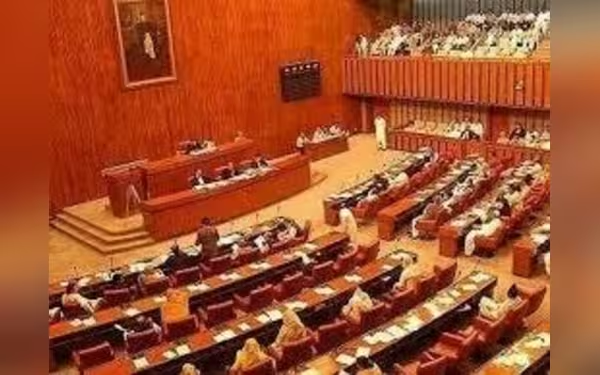Saturday, November 16, 2024 02:12 PM
Senate Opposition Leader Demands Separate Seating Arrangement
- Shibli Faraz requests distinct seating for treasury and opposition members.
- Current arrangement undermines parliamentary order and clarity.
- Opposition members relegated to back rows, raising concerns.
 Image Credits: brecorder
Image Credits: brecorderShibli Faraz demands a separate seating arrangement in the Senate to restore parliamentary order and clarity between treasury and opposition members.
In a significant development within the upper echelons of Pakistan's political landscape, Shibli Faraz, the Leader of the Opposition in the Senate, has formally requested the Chairman of the Senate, Yousaf Raza Gilani, to implement a seating arrangement that distinctly separates treasury members from opposition members. This request comes in light of concerns regarding the current seating setup, which Faraz argues has disrupted the traditional order by mixing members of the treasury with those of the opposition.
In a letter dated September 11, which has recently come to public attention, Faraz expressed his discontent with the existing arrangement. He emphasized that the constitutional framework of Pakistan clearly delineates the roles and positions of treasury and opposition members, and that the current intermingling undermines this clarity. He stated, "Regrettably, the current seating arrangement has disrupted the established order by intermingling the treasury members with the opposition." This statement underscores the importance of maintaining a clear distinction between the two sides in a parliamentary democracy.
Faraz further highlighted that despite being the largest party in the opposition, his members have been relegated to the back rows, while smaller parties, including those with only one member, have been given more prominent positions. This situation, he argues, not only diminishes the role of the opposition but also creates confusion within the parliamentary proceedings. He pointed out that such an imbalance contradicts the very essence of what opposition benches are meant to represent in a democratic setup.
In his letter, Faraz made a strong appeal for the restoration of the traditional seating arrangement, stating, "In light of the above, we demand that treasury members sit on the treasury side and the declared opposition parties on the opposition side in accordance with the global democratic values and traditions of the august house." He urged for immediate intervention to rectify the situation, emphasizing that a proper seating arrangement is crucial for the smooth functioning of the Senate.
It is noteworthy that the current seating arrangement has led to some treasury senators sharing the same side of the aisle as opposition members. Among these senators are four members from the Balochistan Awami Party (BAP), a political entity known for its close ties to the security establishment. This blending of roles has raised eyebrows and sparked discussions about the integrity of parliamentary processes.
As the political landscape continues to evolve, the call for a clear separation of seating in the Senate reflects broader concerns about the functioning of democracy in Pakistan. The opposition's role is vital in holding the government accountable, and ensuring that they have a distinct and respected presence in the Senate is essential for a healthy democratic process. The outcome of this request could set a precedent for how parliamentary decorum is maintained in the future, highlighting the importance of tradition and structure in governance.













